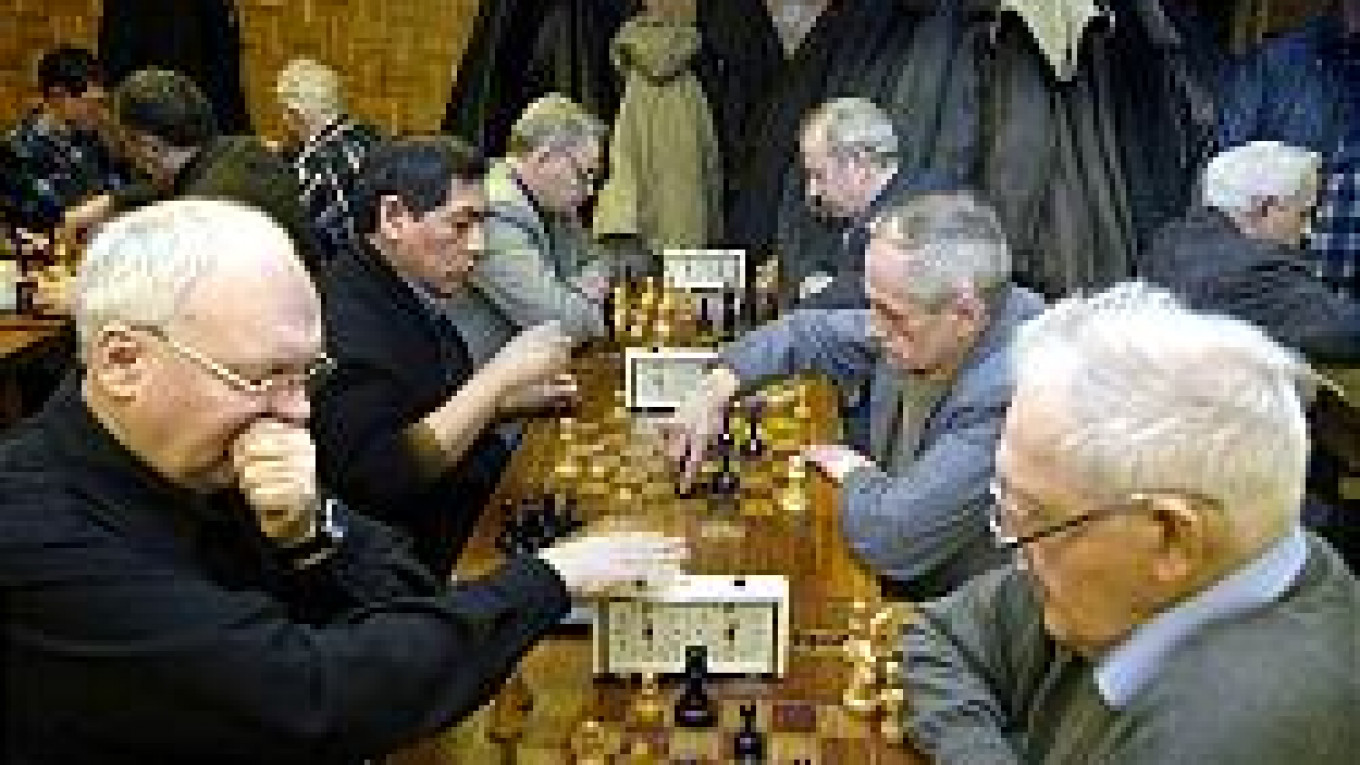Weekends and Thursdays, the cowboys are out in force at the Oktyabrsky (or October) Club, a chain of cramped, dark chambers underneath a secluded apartment building near Metro Oktyabrskaya. At the helm is director Sergei Kurakulov, a gentle, middle-aged man with glasses and a beard. Manning the front desk, he matches up the players, who number close to 60, over a scratchy microphone.
The crowd scatters; voices go quiet. At one table, a Peruvian in a frayed black sweater battles a Russian with an overgrown beard. Nearby, a middle-aged woman squares off against a freckled six-year-old boy. The game is blitz, meaning that each player gets five minutes on the chess clock. As the players bend their heads in absorption, the clatter of the clocks takes over.
In a city that once boasted a chess club in each district, the Oktyabrsky Club, which will celebrate its 25th anniversary on Feb. 23, is the last of a dying breed. Every Thursday, Saturday and Sunday, some 60 players pack the crowded hall. "There are few places in the world where so many grandmasters come to play regularly," Kurakulov said.
And yet players fear that this club, too, might be gone before long. For the last 15 years, the old, run-down apartment building has cropped up on various city government lists for future demolition. Though there has been no final word on the matter, many take it as a sign of newfound hostility to the cultural icons of a bygone age.
"Moscow is now a city for the rich," said Yuri Leonov, an elderly journalism professor who plays at the club. "It is for restaurants, casinos, banks. Such is the dark side of capitalism. The cultural life has been discredited."
The city's one alternative, besides a few schools for youths, is the Tsentralny Dom Shakhmatistov, or Central House of Chess Players, which is also home to the Russian Chess Federation. Founded in 1956 to foster the nation's burgeoning favorite pastime, it is located a few blocks from the Kremlin in a stately 19th-century mansion. Nearly every world champion from the last 50 years has passed through its halls.
Although the Oktyabrsky Club and the Dom Shakhmatistov share players and periodically co-host events, their atmospheres are miles apart. The Oktyabrsky Club is sunk in a cellar, while the Dom Shakhmatistov has vaulted ceilings and large windows that overlook the grand esplanade of Gogolevsky Boulevard. The Dom Shakhmatistov has little of the Oktyabrsky Club's lively camaraderie, though it hosts open tournaments every Sunday morning.
Even so, the Oktyabrsky Club "is for those who want to play, to train," said Yury Averbakh, a retired Soviet grandmaster and historian who donates his time to the center. "It is a living club. This is more of a museum."
But the underground club is also an unusual place to carry on the tradition of the former Soviet chess leviathan. Underfunded and dismally decorated, its future is unsure. According to Kurakulov, maintaining chess since the Soviet Union's fall is an uphill battle. "I personally do not think it is possible to rely on luck. There should be some government structure in place. There is no way for chess to survive here except through the government."
Since 1991, when the government gradually stopped supporting the game, clubs as well as players have had to fend for themselves, waiting for erratic handouts from local administrations and corporate and private sponsors.
"In a way, [the system] is as it should be," said grandmaster Andrei Kharitonov. Whereas in Soviet times government support often led to stagnation, "there is now more of a stimulus to play, to get better. But the opportunities are fewer, and sponsors are not always reliable."
"It's a disaster," commented another grandmaster, Mikhail Kobalya, about the chess world's current predicament. Kobalya is 25 years old and helps train world champion Garry Kasparov. In his opinion, "there are chess players and there is a chess federation, but between them there is nothing. No one is organizing tournaments. No one is cooperating with each other."
The club will mark its upcoming anniversary with a chess tournament and, if funds allow, a cultural event. As to the future, 20-year veteran Alexander Lyubeshkin said: "I have one wish -- that this club, which preserves the spirit of chess and draws such strong players, stays open for those of us who enjoy playing the game. And that it has an illustrious future for many anniversaries to come."
A Message from The Moscow Times:
Dear readers,
We are facing unprecedented challenges. Russia's Prosecutor General's Office has designated The Moscow Times as an "undesirable" organization, criminalizing our work and putting our staff at risk of prosecution. This follows our earlier unjust labeling as a "foreign agent."
These actions are direct attempts to silence independent journalism in Russia. The authorities claim our work "discredits the decisions of the Russian leadership." We see things differently: we strive to provide accurate, unbiased reporting on Russia.
We, the journalists of The Moscow Times, refuse to be silenced. But to continue our work, we need your help.
Your support, no matter how small, makes a world of difference. If you can, please support us monthly starting from just $2. It's quick to set up, and every contribution makes a significant impact.
By supporting The Moscow Times, you're defending open, independent journalism in the face of repression. Thank you for standing with us.
Remind me later.


